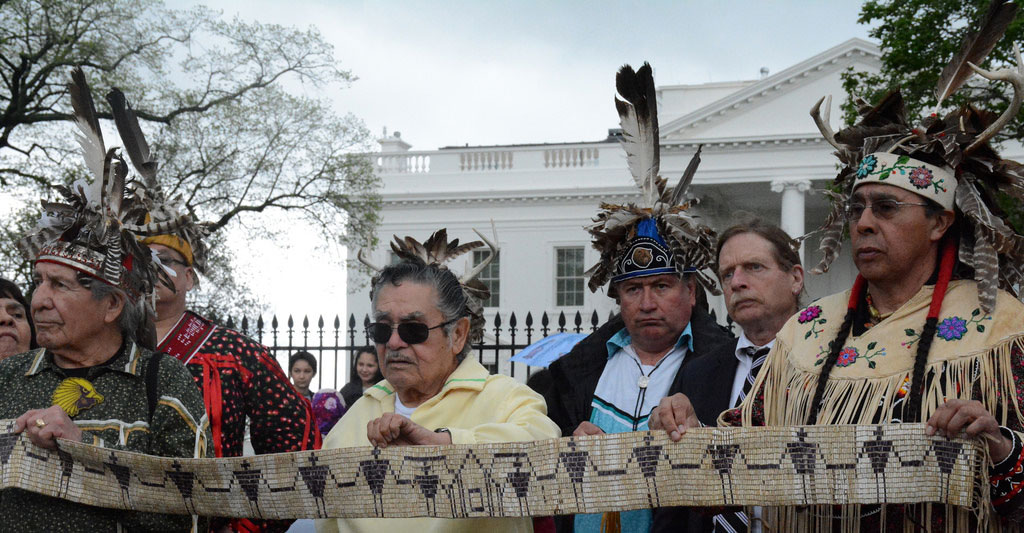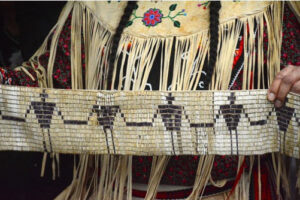
Sovereign Nation in Upstate New York Seeks International Support After U.S. Courts Fail to Address Violations
**LINK TO PHOTOS**
Washington, DC – Today, the Onondaga Nation, a treaty-recognized sovereign Indian nation with its homelands in upstate New York, filed a petition against the United States with the Inter-American Commission on Human Rights (IACHR). Since 1788, 2.5 million acres of land have been stolen from the Onondaga Nation by New York State, and the failure of the U.S. court system has left the Nation with no choice but to seek assistance for human rights violations from the international community.
 To bring attention to the filing, chiefs from the Onondaga Nation and supporters gathered at the Friends Meeting House in Washington, DC wearing traditional dress and with a historic wampum belt commissioned for the Nation by President George Washington to signify peace and friendship while ratifying the 1794 Treaty of Canandaigua.
To bring attention to the filing, chiefs from the Onondaga Nation and supporters gathered at the Friends Meeting House in Washington, DC wearing traditional dress and with a historic wampum belt commissioned for the Nation by President George Washington to signify peace and friendship while ratifying the 1794 Treaty of Canandaigua.
Click here to view photos of the Onondaga Nation’s demonstration outside the White House and the George Washington belt.
Click here to view the Onondaga Nation’s petition and annex to the petition as filed with the Inter-American Commission on Human Rights.
“Our access to basic equality and justice was fundamentally denied by the United States’ courts,” said Tadodaho Sid Hill of the Onondaga Nation. “Now, we’re calling on the international community to help us reach a healing process following centuries of violations and broken promises.”
On March 11, 2005, the Nation filed a Land Rights Action in the United States District Court, which the federal court dismissed. The Nation then appealed to the Second Circuit Court of Appeals, which affirmed that dismissal. Finally, the Nation filed a petition for a writ of certiorari with the Supreme Court seeking review of the dismissal and its affirmance. On October 15, 2013, the Supreme Court denied that petition. No further remedy is available in the United States court system.
“Where the U.S courts failed, the international community can help us preserve our role as an environmental steward of the land,” added Hill. “That means greater access to our surrounding lands and to cleansing the industrial pollution in Onondaga Lake, which remains a vital location to our nation’s spiritual life.”
The response from the U.S. courts bars the Nation from any domestic remedy and refuses it the chance to articulate the violations of New York State dating back to the late 18th Century. The federal courts’ inherently discriminatory ruling refused to consider the merits of the Nation’s case, holding that indigenous peoples’ claims for relief arising from violations of their land rights are “inherently disruptive” and, therefore, cannot be considered.
The Nation’s petition at the IACHR outlines the United States’ responsibility for violations of the Nation’s property rights, equality, judicial protection and due process – outlined in multiple domestic and international agreements, including multiple treaties, the American Declaration of the Rights and Duties of Man and the United Nations Declaration on the Rights of Indigenous Peoples.
A positive result for the Onondaga Nation at the OAS could establish a framework to resolve the ongoing dispute and offer a case study for indigenous peoples barred access to justice by the U.S. court system.
The Onondaga Nation has never sold or otherwise relinquished its lands or its rights as a sovereign nation. Between 1788 and 1822 the State of New York took approximately 2.5 million acres of Onondaga Nation land, violating federal law, the Constitution and various treaties. Major land “acquisitions” by New York State in the 18th century were conducted with unauthorized individuals without the knowledge or consent of the authorized Onondaga chiefs. On multiple occasions, the State deceived the Onondagas into thinking the State was only leasing the land.
About The Onondaga Nation: The Onondaga Nation is one of the six nations of the Haudenosaunee (Iroquois) Confederacy. Onondaga Nation survives as a sovereign, independent nation, living on a portion of its ancestral territory and maintaining its own distinct government, laws, language, customs, and culture. Today, the Onondaga Nation consists of a 7,300-acre territory just south of Syracuse, NY.
